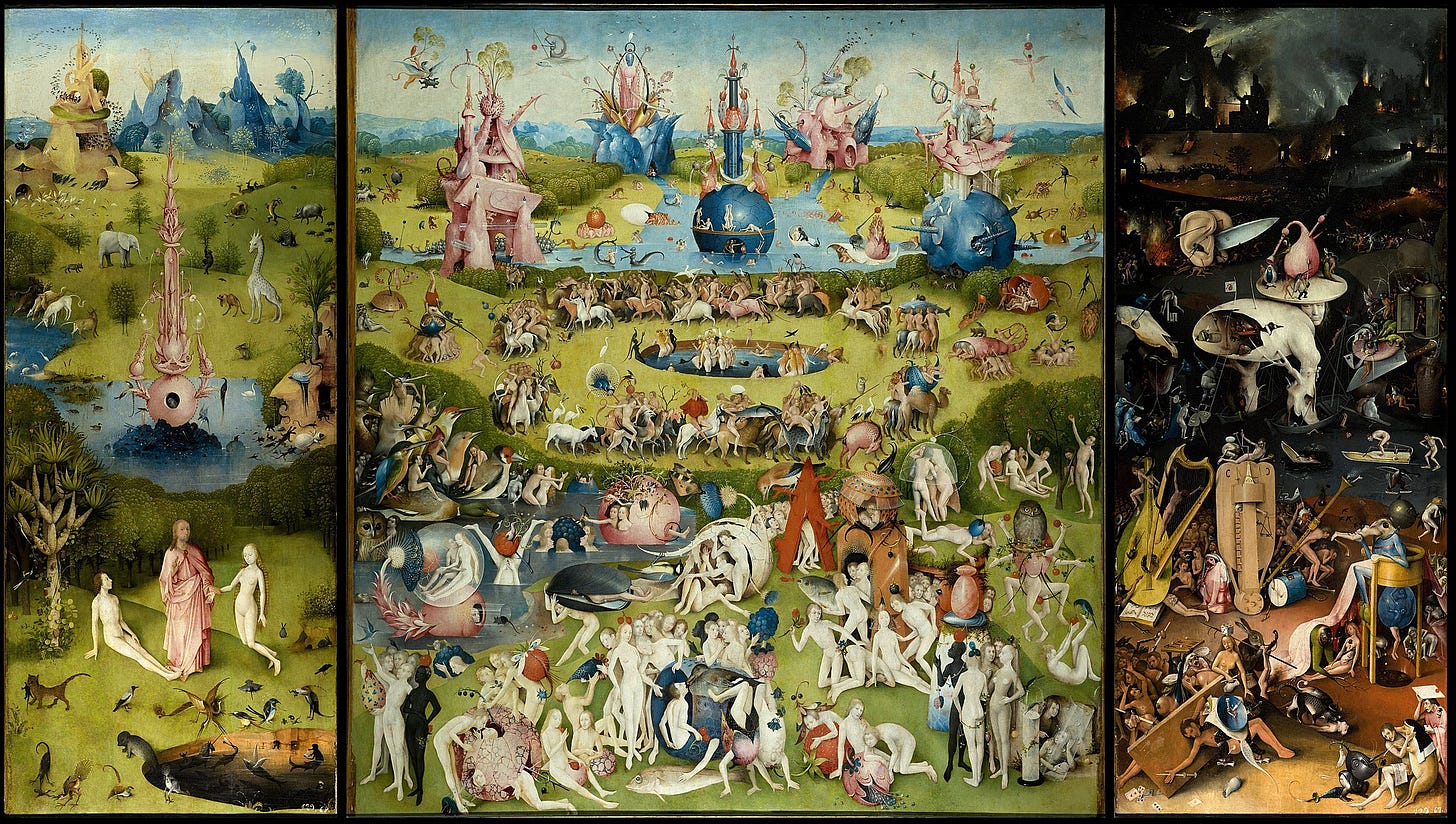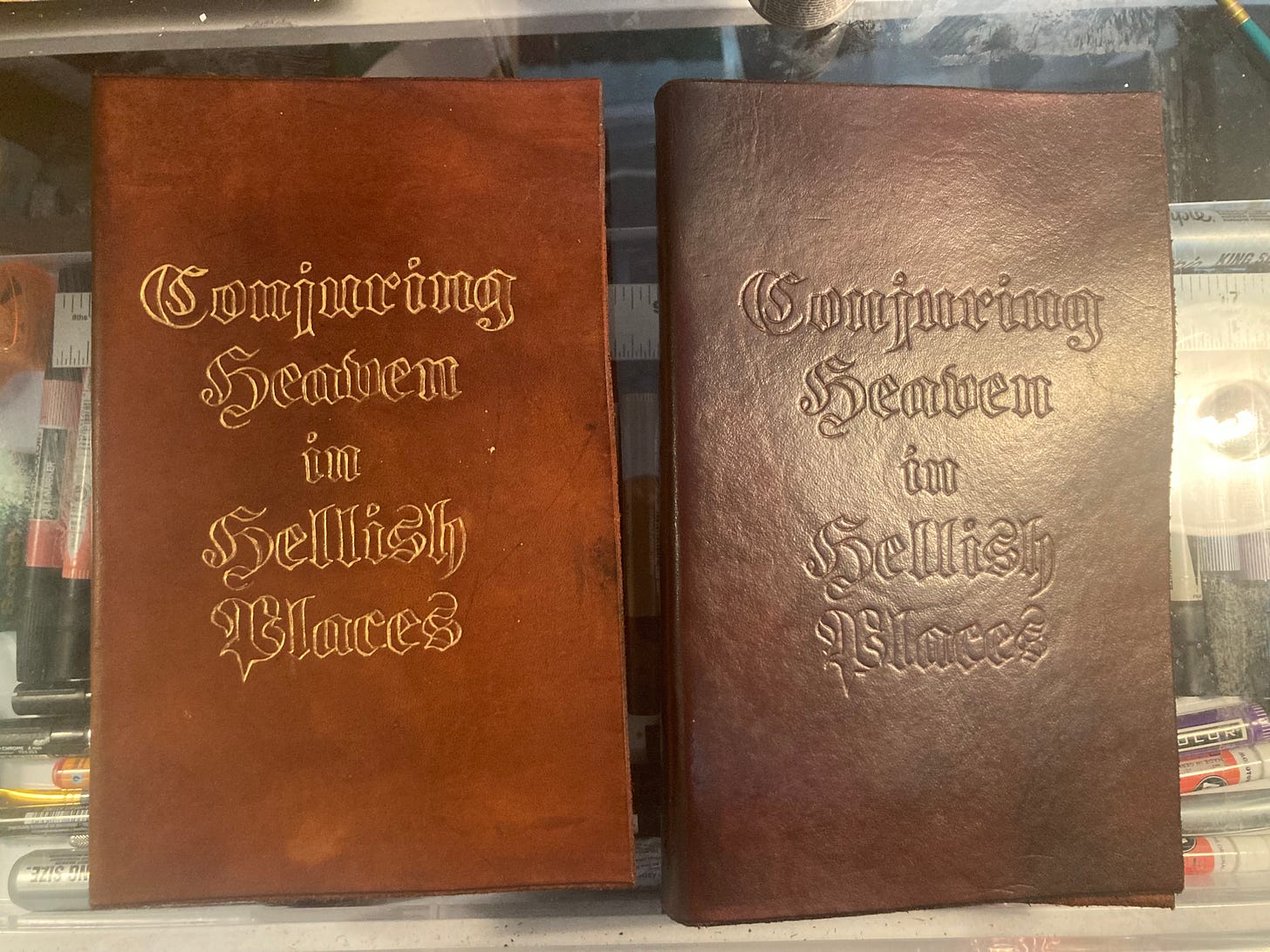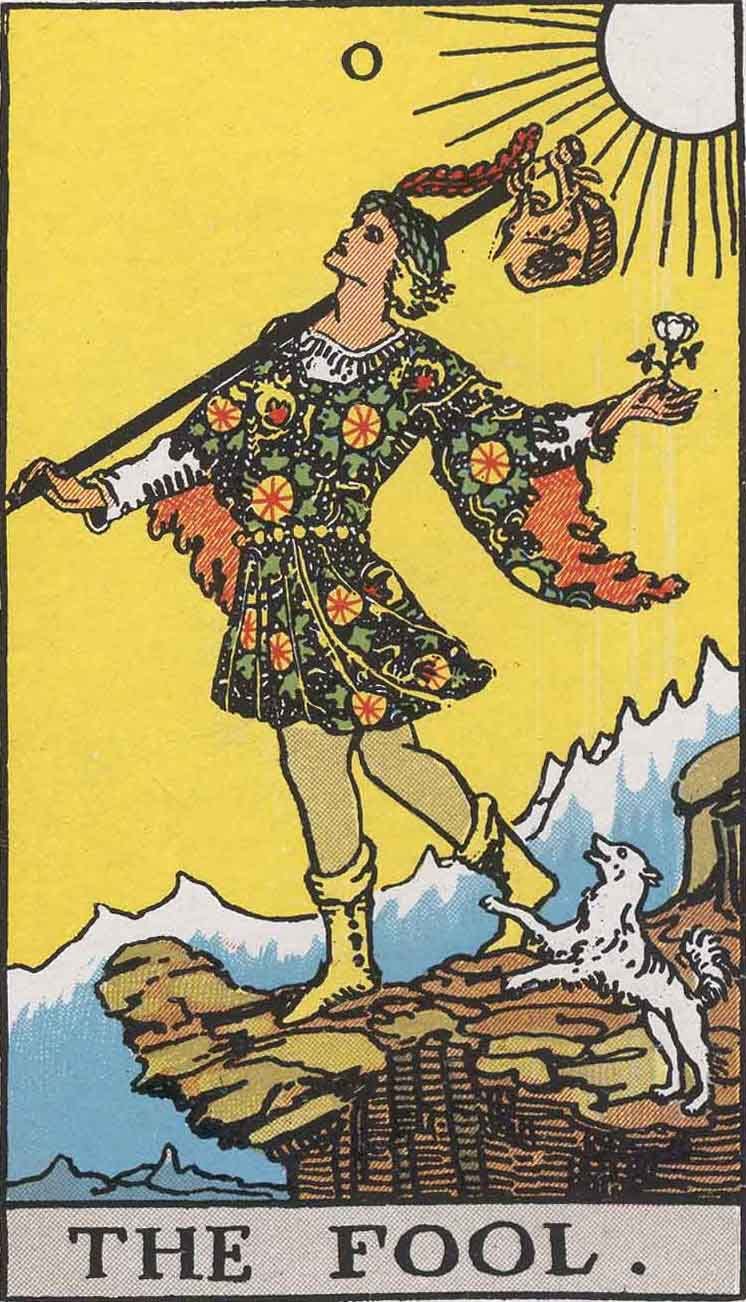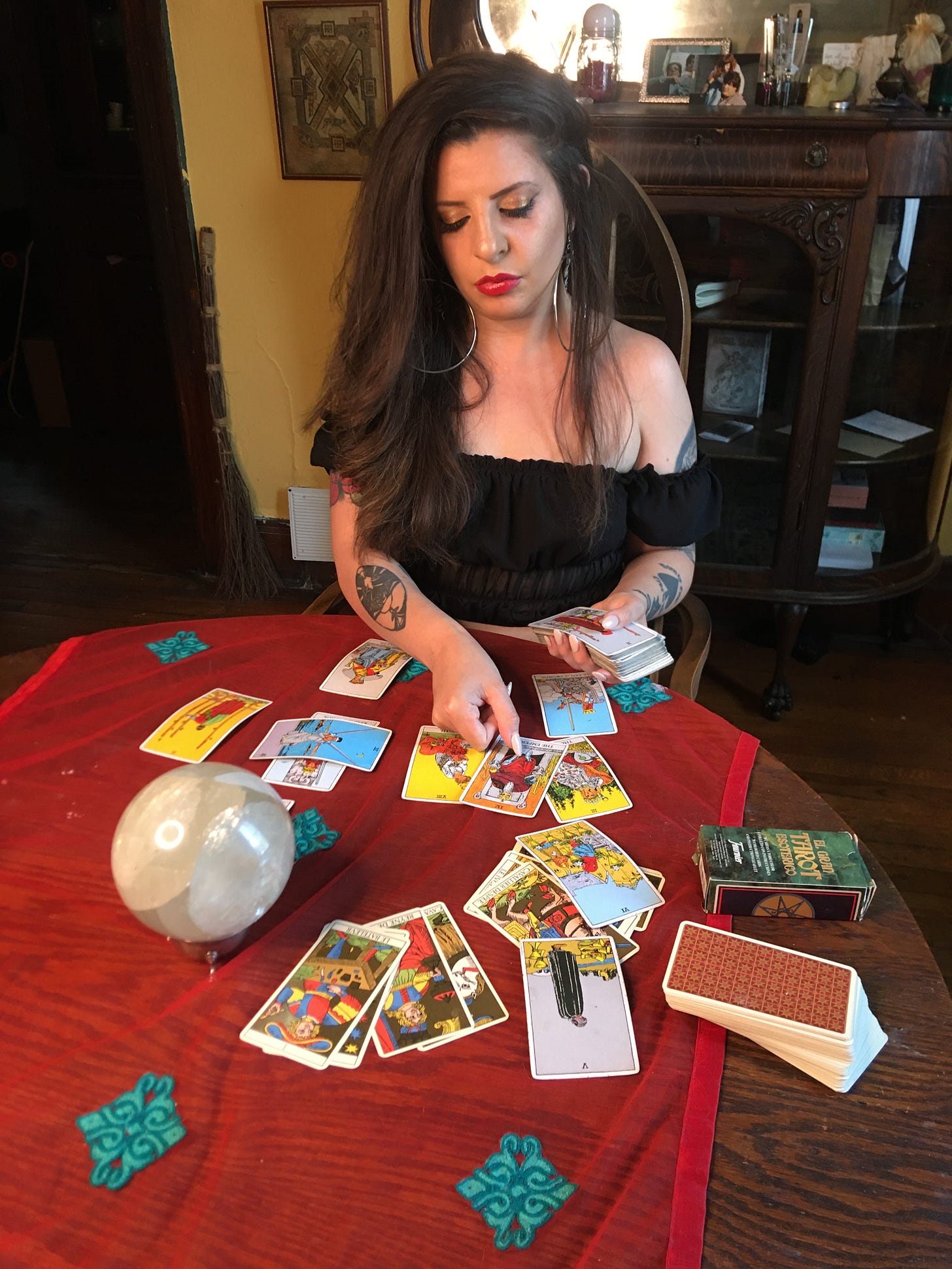Everything is ensouled
A conversation with ceremonial magic practitioner and tarot reader Alejandra Villegas
Alejandra Villegas has been reading the tarot and crystal ball for over twenty years, a gift she continues to offer through her business Gemineye Tarot. She is a practitioner of ceremonial magick — an occult tradition related to (but not synonymous with) hermeticism, witchcraft, and esotericism. A dedicated prison rights advocate, she teaches ceremonial magick to incarcerated people. She sees the tradition as particularly well-suited for people in confinement, and she is working to make it even more so. Alejandra and I met as classmates at divinity school, where she spent much of the year creating a grimoire — a ritual magick instructional text — specifically geared toward serving an audience who is imprisoned. On top of all that, she also owns and operates an underground, vinyl-only metal record label called Sangreal Records in her hometown of Detroit.
All these pursuits are extensions of Alejandra’s scholarship and practice of occultism and heresy. She recently offered a tarot divination on her Substack, in which she described herself as stationed at a crossroads, lantern in hand, illuminating the way for fellow heretics. I love her application of the word “heretical,” which she says is anyone or anything “who dares deviate from convention, who perceives an existence not restricted by false hierarchies.” Heresy, then, is something to aspire to, to seek solidarity within.
In the world of religious studies — which is the world that brought Alejandra and me together — there is a lot of discussion and debate around the “scholar-practitioner,” in other words, an academic who belongs to the community they study. Some question whether a faith practitioner can be impartial enough to conduct objective research; others believe that study and practice go hand-in-hand, and that an insider’s perspective deepens the scholarship.
Alejandra is one of the best examples I know of the exemplary scholar-practitioner. She investigates and practices with a seemingly endless supply of integrity, curiosity, and generosity. Her writing and research is deeply informed by her personal experiences and values, her political commitments, and her acute ability to discern and illuminate truth. Personally, I feel incredibly lucky for our paths to have crossed — she has offered me immense friendship, wisdom, constructive criticism, and support in the relatively short time I’ve known her.
This conversation has been edited and condensed for clarity. Many thanks to Alejandra for speaking with me! Follow along with her work on Instagram and Substack. Private divination appointments (which come highly recommended by yours truly) are available at Gemineyetarot.com.
ELLIE DUKE: One link I see between what I’ve been writing about in Wow Is Me and what I know about your work is this endeavor to see the world as an enchanted place, and to cultivate practices around experiencing it as such. Does that resonate with you?
ALEJANDRA VILLEGAS: Yeah, absolutely. For me that’s part of the philosophy that informs my worldview, which is related to thinking everything is ensouled, everything has an inherent value. Everything is sort of speaking to us, which can feel a little manic at times, as well. It also brings another more complicated response into the fold, which is that then we have to hold a certain regard for the things and people around us. You're kind of processing that it's alive and it has a capacity for joy, but we might also be making it suffer too. Or, we most definitely are.
How do you deal with that manic quality? Do you have ways of protecting yourself, or filtering things out?
I try to be grounded because I do tend to get emotional. I'm also very self-indulgent, maybe? With things that are kind of cheesy, or that allow me to disassociate. So that’s part of how I filter, as well as doing quite a lot of protective work and rituals and things like that.
Something you’ve helped me appreciate is the idea of respecting “darkness” or “shadow” for its own sake — not just as a counterpoint to light, as I have often approached it. I’m not really drawn to “darkness” but I’ve learned, in part from you, that it has its own value and offerings and wisdom, not just in opposition but inherently.
I think about that a lot. When I'm out in the world in a general population, I feel like I get perceived as “dark” more than I would in my own little subculture. So I think part of it is a little cultural and social. But I do think about what darkness is, in relativity to light. What’s the beauty there? Or how is it light, in its own way?
Occultism is the pursuit of hidden information for the sake of wisdom. And that means that any suppressed info I stumble on can be spiritual and Esoteric in nature — whether it’s demonology and ceremonial magick, or it can be things like child abuse cover ups in congregate care like group homes or juvenile detention centers. It has a really wide wingspan.
Sometimes, with the morbid or awful things that I can be drawn to investigating, when I get to a certain point, when I’m inundated or oversaturated in them, they can take on this Hieronymus Bosch-like quality, where it’s bizarre and grotesque and surreal. And I know that there is a truth to it, and that’s somehow inherently beautiful. Maybe that’s what’s compelling me towards it. That’s where the merit is, or where the honor is, even if it feels really uncomfortable.

I’ve had two experiences where I’ve asked for your help because I thought there might be some kind of dark presence with me. Once when my car odometer was stuck at 66,666, and once when we were in a house that our friend Phillip thought was haunted. Both times, there was this anticipation, this fear of what might be revealed. And both times, it totally wasn’t scary. It was interesting, because we had this expectation about a potentially frightening thing, but once had been demystified, it lost all its teeth. There was even a playfulness there.
Because it’s the unseen, right? We're always a little bit afraid of what we can't see and by extension can't know. And then we get a little more familiar with it…and it's like, dead people are people too! You know?
Ha, right! That’s a real theme in your work — this pulling back of the veil, which is a form of liberation. And you work with a lot of people who are marginalized, and some who are literally imprisoned, as well as texts and practices that have been relegated or forced into secrecy throughout history. What does it mean to you, to be working towards liberation on that level?
It sort of comes naturally to me. It's intentional, but at the same time, it's sort of second nature, because of a way that I was raised to ask: “where should I be putting my efforts?” Probably collaborating with people who have less agency than myself.
I do see ritual and magick as practices that are liberating, because they allow you to transcend on all these different levels. But there’s also a built-in circular nature, because these practices result in persecution. And then, if you are persecuted for any reason, the rituals I gravitate towards are there to support people in that particular predicament.
Also, I do have more of a sense of my own agency, because of it. You can understand your own power to a much greater degree when you position yourself next to somebody whose freedoms are curtailed in every possible way by being incarcerated. So there’s this much bigger sense of “I can do this” now, versus what I would have thought prior to working with incarcerated people. When you put yourself beside somebody who is legitimately imprisoned and prohibited from doing so many things, you do get a sense of your own freedom and power.
I've also definitely learned the real meaning of self-reliance, of perseverance and resourcefulness, through dealing with people who will just make something out of nothing.
That quality exists in your students already, and then you’re teaching them rituals and practices that can help cultivate it in a different way, which is awesome. Can you talk a little bit about your grimoire?
My grimoire is a collection of rituals that are based on an existing tradition of ceremonial magick. Grimoires come from a medieval tradition, not exclusively, but largely. And medieval narratives, in general, are all building on each other. We have this perspective now based on copyright laws that, say, an author wrote this, and therefore it is their intellectual property. But when you’re looking at literary traditions from the Middle Ages, they’re much more collaborative. That’s true of grimoires; you’re basically engaging in a collective work. And a lot of these works were anonymous because of persecution and punishment.
So my grimoire is drawing on that tradition, and hopefully evolving it to have some staying power, and to make it more accessible as well. For example, I removed a lot of the gender pronouns. And a lot of the rituals tend to be highly dynamic, with a lot of movement and dictation. But since it’s deployed in prisons, there’s not a lot of space. So I basically say, if you are physically limited due to space, or because your ability prohibits you from doing a ritual that requires a lot of movement, here’s the original ritual and then here are modifications. And all the rituals are curated — they can address specific material needs, as well as emotional, mental, or spiritual needs that can be encountered. So it’s a way of coming into contact with divinity, but it’s also addressing some very real needs.

Tarot is kind of your main gig, but it’s also just one piece of the puzzle for you. Where does it fit in?
I think tarot is the most legible. It’s synonymous with occultism in a way. Like, if you’re watching a movie, and someone feels spiritually deflated, and they are looking for answers, something a therapist or doctor can’t give them, tarot is the entry point. If you know tarot, you’ve probably got your foot in the door with all the other stuff, too. So, that’s why I’m a tarot reader.
That’s part of what I see as you having this skill for translation, which is that you offer entry points for people, into other worlds. And tarot was your entry point, right? You started reading when you were a kid?
Yes, that’s right.

Do you see a connection between your work reading the Tarot and practicing ceremonial magick, and your underground metal record label, Sangreal?
Yeah, absolutely. With occultism and esotericism and ceremonial magick, there's no central religious organization, there's no central doctrine. So its means of transmission is the arts, whether that's literature or fine arts or music. In the case of my record label, it is coming from a place of a very strong passion towards metal music, which has had a connection to occultism and esotericism and rituals since its inception because of its relationship to rock'n'roll, and rock'n'roll’s relationship to being “the devil's music.” So it's basically a home for heretical practices. And people who are interested in metal also tend to be interested in occultism, even if they're not practitioners.
It also seems like there’s also something about the fact that you are putting out music by underground artists, and only recording on vinyl. It feels linked in that way too, to me, because it’s about the margins.
Yeah, there is definitely this parallel underground thing with it. Also with the type of metal that I'm interested in — it’s an arcane tradition, we’re living in the past. Metal isn't mainstream, you know, but we're still traditionalists in a way. Even though vinyl is popular now, we were putting stuff out and collecting vinyl when it fell out of favor. And it sounds douchey and pretentious, but the recording style that we use tends to be analog. You know, going for that production style versus super-produced and digital-sounding.
I meant to start with this, but maybe we can end with it instead. Can you introduce yourself the way you prefer to be introduced?
I’m a practitioner of ceremonial magick. And I’m a Catholic, but like, a Catholic in very bad standing.
You still consider yourself a Catholic? I didn’t know that.
Yeah, I do. I’m Irish-Mexican and it’s a huge part of our history, for better and for worse. But I don’t think the Catholics would…I mean, I know that they don’t claim me. They’re like, “we don’t know her.”
If you are interested in joining Alejandra in the fight for justice and dignity for all beings, she suggested donating to Foster Kids United, a virtual nonprofit serving foster youth ages sixteen to twenty-four nationwide, and volunteering to be a pen pal with an incarcerated person through Abolition Apostles.




